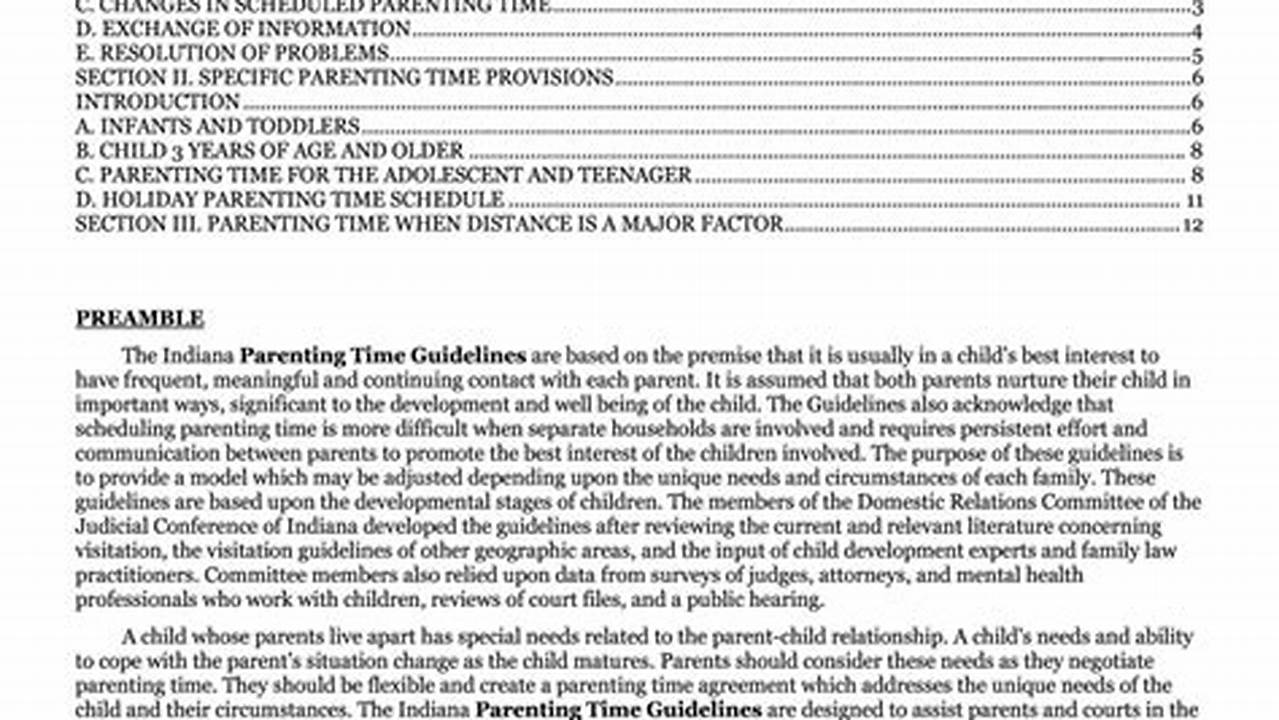Navigating the complexities of shared parenting requires a clear understanding of legal frameworks and available resources. This information pertains to the legal landscape of parental rights and responsibilities in Indiana, specifically focusing on the established standards for time allocation and recent changes that impact families. Access to this information is vital for parents, legal professionals, and related parties to ensure the well-being of children involved in custody arrangements. Understanding the guidelines promotes consistent and predictable schedules, fostering healthy child development and positive co-parenting relationships.
Key Aspects of Indiana’s Child Custody and Parenting Time Structure
The state’s framework prioritizes the best interests of the child, considering factors like each parent’s ability to provide a stable and nurturing environment.
Standard Possession Schedules
Indiana offers a standard schedule that serves as a baseline for parenting time allocation, promoting predictability and consistency for children.
Deviations from the Standard Schedule
The standard schedule can be modified to accommodate unique family circumstances, ensuring flexibility when necessary.
Factors Influencing Parenting Time Decisions
Judicial decisions regarding parenting time are based on specific criteria, including the child’s age, health, and parental fitness.
Relocation and its Impact on Parenting Time
Relocation by a parent requires careful consideration and legal procedures to adjust parenting time arrangements appropriately.
Modification of Existing Orders
Life changes necessitate modifications to existing orders; understanding the process for requesting these adjustments is essential.
Enforcement of Parenting Time Orders
Mechanisms are in place to ensure compliance with court-ordered parenting time schedules.
Role of Mediation in Parenting Time Disputes
Mediation offers a collaborative approach to resolving parenting time disagreements outside of court.
Importance of Legal Counsel
Seeking legal counsel provides parents with expert guidance in navigating the complexities of parenting time laws.
Available Resources for Parents
Various resources exist to support parents in understanding and adhering to parenting time guidelines.
Tips for Successful Co-parenting
Open communication, respectful interaction, and prioritizing the child’s needs contribute to successful co-parenting.
Documenting Communication and Interactions
Maintaining accurate records of communication and interactions related to parenting time is crucial.
Understanding the Child’s Perspective
Considering the child’s feelings and needs throughout the process is paramount.
Seeking Professional Support When Needed
Utilizing resources such as therapists or counselors can provide valuable support for families navigating co-parenting challenges.
What if one parent consistently violates the parenting time order?
Legal recourse is available to address violations, including court intervention and potential sanctions.
How can I modify a parenting time order if circumstances change?
Modifications require a formal request to the court, demonstrating a substantial change in circumstances.
What is the role of a Guardian ad Litem in parenting time cases?
A Guardian ad Litem represents the child’s best interests and provides recommendations to the court.
How does Indiana define “best interests of the child”?
The “best interests of the child” standard considers numerous factors aimed at promoting the child’s physical, emotional, and developmental well-being.
Where can I find legal aid resources for parenting time issues in Indiana?
Several organizations offer legal assistance, including Indiana Legal Services and pro bono programs through local bar associations.
What are the potential consequences for failing to comply with a parenting time order?
Consequences can range from court-ordered make-up time to fines or even changes in custody arrangements.
Staying informed about current legal standards and utilizing available resources empowers parents to navigate parenting time arrangements effectively, ultimately promoting the well-being of their children.


